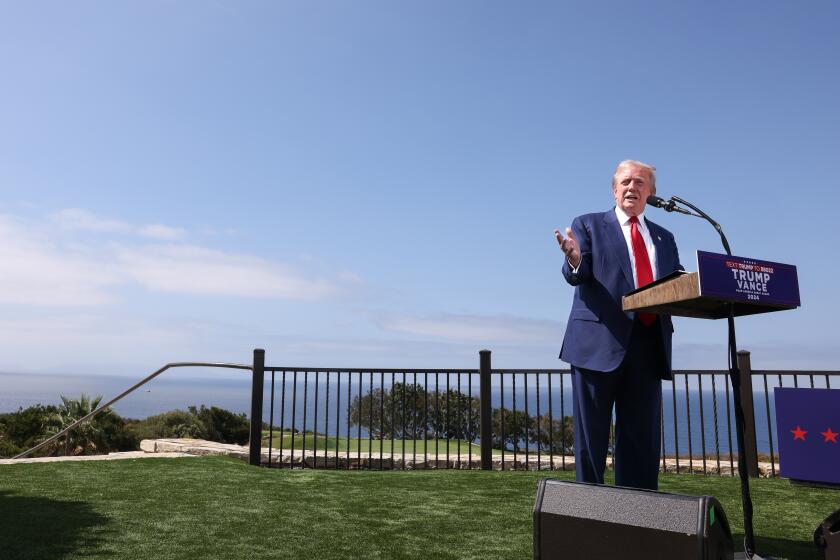‘Send a message’ ads expected to swell
Before a major revision of campaign finance laws five years ago restricted certain political advertisements in the weeks before an election, the airwaves were filled with blunt appeals to voters to “send a message” to specific candidates.
Because of Monday’s Supreme Court decision relaxing those limits, candidates and television viewers can expect a plethora of such ads during what had been blacked-out periods before primary and general elections.
The ruling gives potential advertisers television access, handing them one more tool to influence elections by pressuring candidates on specific issues.
Groups that might take advantage of the ruling -- the National Rifle Assn. and the National Assn. of Manufacturers, for example -- were uncertain how they would do so because it’s impossible to say whether specific issues important to them will be topics of debate before the election.
But there was general agreement in two areas: The ruling will make it easier for them to jump into the political fray as an election nears without worrying that their ads could land them in prison, and the airwaves will almost certainly be more crowded with direct political appeals identifying politicians by name.
“The NRA or the Sierra Club will be more free to engage in advertising under the ruling and may be more inclined to do so,” said Jan Witold Baran, an expert on campaign finance law.
Indeed, said Wayne LaPierre, the NRA’s executive vice president, if candidates made claims that angered his organization “within 60 days of an election, you can expect to have the NRA on the air, in their face, with an ad.”
The law that the court overturned was a key provision in the broad campaign finance law that President Bush signed reluctantly and that had drawn criticism as a confusing limit on free-speech rights.
Specifically, it banned advertising that was sponsored by any group receiving corporate or union funding and that urged viewers to contact a specific politician about his or her stand on a particular issue.
Potential beneficiaries of the ruling include a diverse array of groups, including labor unions, environmental organizations and trade associations representing specific industries such as pharmaceutical manufacturers or trucking companies.
At both ends of the political spectrum, there were cheers for what such frequent opponents as the U.S. Chamber of Commerce and the AFL-CIO -- along with others in between -- praised as a decision giving greater voice to average citizens, even if advocacy groups were the ones presenting their views.
“The court’s ruling has the potential to dramatically open up public debate in this country,” said Pat Toomey, president of the Club for Growth, a conservative group that focuses on economic issues.
The campaign finance law, sponsored by Sens. John McCain (R-Ariz.) and Russell D. Feingold (D-Wis.), created widespread confusion over whether specific ads would be permissible or would cross a fuzzy line that would bring complaints from the Federal Election Commission and possible criminal prosecution.
By no longer prohibiting such ads 60 days before a general election or 30 days before a primary, the decision “gives organizations like ours the operational freedom to decide when to weigh in, rather than trying to avoid artificial restraints of federal law,” said Steven J. Law, chief legal officer and general counsel of the U.S. Chamber of Commerce.
Before the ruling, he said, “people were very concerned about the legal terrain and weren’t willing to take the risk.”
The ads, generally aimed at incumbents, are meant to influence their votes on issues before Congress, where some of the most controversial matters are put off until the fall, late in the session. It’s on these matters that outside groups are actively seeking to influence votes -- and during which access to television was prohibited.
An increase in such ads also could force incumbents to publicly defend themselves on television.
“It’s going to mean politicians will have to spend money defending their voting records,” said Chuck Rocha, national political director of the United Steelworkers union.
More to Read
Get the L.A. Times Politics newsletter
Deeply reported insights into legislation, politics and policy from Sacramento, Washington and beyond. In your inbox three times per week.
You may occasionally receive promotional content from the Los Angeles Times.










